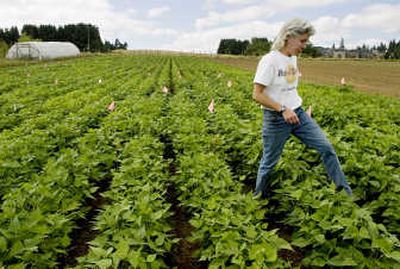Researcher digs growing beans for home, abroad

VANCOUVER, Wash. – Washington State University researcher Carol Miles has spent many months over the past five years traveling from Vancouver to Africa, planting, harvesting and cataloging beans.
Her purpose is to help American farmers earn a profit and to help African farmers feed the hungry.
Quietly and steadily, the internationally known vegetable horticulturist has joined her assistant, Liz Nelson, and a changing crew of graduate students to test a new exotic mix of dried beans. In Western Washington and Oregon, the new varieties may produce major profits for small, specialized niche farms.
For African farmers, Miles and her students have been working to increase seed production of red kidney beans and get them into the hands of farmers where transportation systems are poor.
“In Washington, we’ve been using colored and patterned beans,” Miles said before leaving to work in Malawi. “These are beans that are not on the shelf anywhere, beautiful old beans, heirloom, in very pretty colors and patterns, that farmers have been selling from Olympia to Western Oregon, often at several dollars a pound.”
They’ve been a success, for example, on Laura Masterson’s 47th Avenue Farm in Portland as well as at Ayers Creek Farm in Gaston, Ore. Masterson said she’s been growing and selling Jacob’s Cattle beans and cannellini beans that Miles developed, and has just started growing other varieties of dry beans from Miles’ stock.
“The beans are great. They are definitely profitable for us, a nice little niche option,” said Masterson.
Miles’ work isn’t all beans. She also has been studying a cornstarch-based, biodegradable mulch to replace the common black plastic that lingers for years in landfills.
She’s been growing more than 100 varieties of watermelon. She works with graduate student Jamie Cummings on spinach variety trials. She also has worked to develop hearty Pacific Northwest butternut squash with Molly Jahn, now dean of the University of Wisconsin College of Agricultural and Life Sciences.
But it’s unclear whether any of this research will continue at WSU’s Research and Extension Unit in Vancouver. In the spirit of economizing the state’s agriculture research functions, much of the work is being transferred to other sites.
Miles and entomologist Lynell Tanigoshi, the Vancouver station’s two major researchers, have moved their offices to WSU’s Northwestern Research and Extension Center at Mount Vernon. Researcher Tom Walters, also based at Mount Vernon, continues some blueberry and raspberry experiments in Vancouver.
Miles said she just plans to carry on her work wherever it’s allowed and let Blair Wolfley, southwest district director of WSU Extension in 11 Western Washington counties, talk about the future of the Vancouver site.
Miles, who joined WSU in 1994, also has studied alternative high-value crops including edamame (vegetable soybeans), baby corn, pea shoots, wasabi and bamboo.
Miles’ interest in sustainable agricultural systems seems to have grown naturally out of the pattern of her life.
Born in Rangoon, Burma, she attended grade school in Turkey, Nigeria and Panama. She graduated from high school in Afghanistan. She served in the Peace Corps, teaching vegetable production in Cameroon. There she also worked on a bean and cowpea project studying crop balancing and pest issues.
She also worked on preventing blindness in Malawi with the Helen Keller Foundation and Save the Children. She saw subsistence agriculture in all these places, and her goal became working with farmers to create sustainable production systems that help both the family and the community.